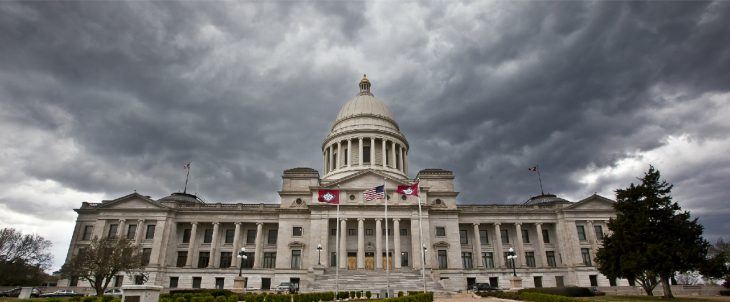Leaders plan fiscal session balance of lawmaking, social distancing
by March 20, 2020 6:26 pm 805 views

The 236-member Georgia Legislature has been urged by leaders to self-quarantine after a senator showed up for a vote feeling a little sick and later tested positive for the coronavirus. Arkansas’ 135 legislators would like to avoid a similar fate when they meet April 8 for the constitutionally required fiscal session.
“I think when we do convene you won’t see 135 members plus the Supreme Court plus the directors all cram ourselves into the floor of the House for a State of the State address,” said Senate President Pro Tempore Jim Hendren, R-Gravette. “You won’t see that. You’ll see us do absolutely the minimal amount of congregating as groups that we can to do our business.”
The law requires legislators to go into fiscal session for 30 days with a possible 15-day extension. This year, the law requires it to begin April 8, later than usual due to Arkansas moving its primaries to early March. The state’s new fiscal year starts July 1, and lawmakers will need to act on Gov. Asa Hutchinson’s proposed $5.89 billion budget.
How it all works – and how creatively lawmakers fulfill their required duties – is still an open question. The quickly changing nature of the coronavirus epidemic makes it harder to plan a fiscal session that begins in less than three weeks.
When they convene, legislators quickly will pass the appropriations that fund the session, and they’ll also pass the usual resolution allowing the session to extend from 30 days to 45 days.
As is customary, that resolution will allow for a recess of greater than three days, which will give lawmakers greater flexibility, said Speaker of the House Matthew Shepherd, R-El Dorado.
Hendren said the Senate is studying if it can legally address issues like the required number of members for a quorum. It’s possible that instead of having 18 senators on the floor, they could be somewhere in the Capitol and voting remotely.
Shepherd said the House is studying other legislatures to see how they are responding to the pandemic; he mentioned Georgia’s situation. The House could adopt rules such as voting by proxy or voting remotely. Perhaps voting could be extended so all House members aren’t in the same place at the same time. Lawmakers might batch a larger number of bills than they have in the past.
He said he has been consulting with health professionals. If things haven’t changed much by April 8, House members and other individuals likely will be screened as they come into the chamber. He said he wants to allow “as much public access as prudent.”
The fiscal session is designed to allow lawmakers to pass a state budget, but they can also consider other issues with a two-thirds vote. Many lawmakers have been reluctant to do so in order to avoid transforming it into another regular session.
Hendren said lawmakers could consider issues such as delaying or adjusting planned tax cuts “because we know a budget crisis is going to come, and we may need some of those dollars to help with some of the relief efforts.” Lawmakers could add greater flexibility and availability for unemployment insurance benefits.
The Arkansas State Capitol is a touchy place where members and the public interact in very close contact with lots of handshakes and hugs. Many committee meetings are standing room only.
Hendren said legislators have a responsibility to pass a budget, “but also not make it worse by convening in a mass group in the Capitol, then spreading this disease back to our districts.” He said he would encourage senators to practice social distancing as the Centers for Disease Control and Prevention recommends.
“There’s not going to be a lot of hugging and physical contact … I believe in following the guidance of people who are smart, a lot smarter than I am about this,” he said. “And so yeah, it’s going to be a unique situation – one that probably has never happened and I hope never happens again in Arkansas where we have those kinds of constraints about social interaction.”
Hendren and Shepherd noted that all meetings will be live streamed. The Senate began live streaming in 2019.
“Our goal is that hopefully we can conduct business as usual and that we can meet and go about our business,” Shepherd said. “Right now, if we were convening today, that would definitely be a challenge given the situation that we’re under.”
